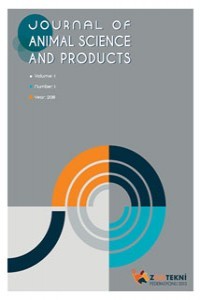
Hayvan Bilimi ve Ürünleri Dergisi
Yazarlar: Hüseyin Baki ÇİFTÇİ, Sedat AKTAN, Veli Can BAŞKAR, İskender YILDIRIM, Ali AYGÜN
Konular:Mühendislik, Ziraat
Anahtar Kelimeler:GnRH,Fertility,Serum,Quail,Testosterone
Özet: The decrease in fertility of aged cocks results with decreased hatching rate. Male fertility is under the control of the hypothalamus-pituitary and testicular axis. Therefore, the objective of this study is to measure the effect of chicken GnRH-I (cGnRH-I) on serum testosterone concentration and egg fertility. Twenty weeks old male and female Japanese quail were kept in cages and fed ad libitum. Quails were randomly divided into 4 groups as phosphate buffered saline group (PBS), 5 µg cGnRH-I group, 20µg cGnRH-I group and group received no injection (Naturel group, N group). Each group included 8 replicates and each replicate made up randomly selected 8 females and 2 males. Only male birds were subcutaneously injected once a week for three weeks with 200 µl as PBS, 200 µl PBS containing 5 or 20µg cGnRH-I. One week after the last injection, eggs from each group were weekly collected and incubated for 11 days and broken on day 12 then the numbers of fertilized and unfertilized eggs were determined. Blood samples from the males were obtained from the jugular vein. Serum was extracted from the clotted blood by centrifuging. Total serum testosterone levels were measured by competitive immunochemistry. Injection of 5µg cGnRH increased serum testosterone concentration over PBS injected group other differences were not statistically different. Injection of cGnRH did not cause significant changes in fertility rates. To conclude, 20 weeks old male quails were injected with cGnRH-I and giving extra GnRH-I did not cause any difference in fertility, since there was plenty of GnRH in their blood.